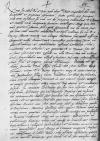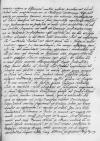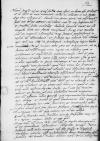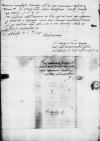Letter #2807
Marco de la TORRE to Ioannes DANTISCUSCracow (Kraków), 1545-03-23
English register:
Marco de la Torre wishes to receive regular information about Dantiscus’ health — good news on the matter is a relief to him in his own struggles with illness. He prays that Dantiscus live as long as possible for the good of the Catholic faith and religion, of which he is an anchor.
Heresy has spread far and wide in the [Grand] Duchy of Lithuania, but God has provided a defence in the person of Marcin Kurek (Gallinius) of Proszowice. Marco de la Torre outlines his complicated story to Dantiscus.
Ten years ago, after four years in the service of Marco de la Torre as a notary, Kurek committed theft and spent a month in a convent dungeon in Cracow. After serving his punishment he asked to be accepted into the monastic order and sent to Bohemia, but de la Torre sent him back to his parents, to confer with them about his future. Since the young man firmly stood by his requests, de la Torre sent him to study in Padua. Kurek assumed the habit there and in the course of five years made enormous progress in philosophy and theology.
Upon completing his studies, having deceived the general of the order that Marco de la Torre had recalled him to his country, he received his doctoral degree without a fee and went to Rome. There, he used deception to obtain an assignment taking him to the Bishop of Cracow [Piotr Gamrat], and with this assignment (in layman’s clothing) he came to Cracow. After finding out about this, and in accordance with regulations, Marco de la Torre ordered his arrest, but Kurek got wind of the danger and fled, wandering across the Kingdom for four years until one day, by accident, the Bishop of Płock [Samuel Maciejowski] heard him deliver a sermon and took him away to Brześć. There, he preached before the King [Sigismund I], winning great respect. He was also introduced to the King jr. [Sigismund II Augustus] and aroused in him an extraordinary eagerness to fight against dissenters from the faith and morals in Lithuania. The Bishop of Płock contacted Marco de la Torre, from whom Kurek then obtained proper absolution and a blessing for his further, now legal, pastoral activity.
Marco de la Torre thanks Dantiscus for the muscat, which he uses to treat his old body.
He promises to carry out his task when the queen [Bona] visits him in his chamber on the eve of the Annunciation [24 March].
Sigmund von Herberstein has brought news that the two monarchs [Emperor Charles V and King Francis I of France] fortunately have reached an agreement, the council in Trent has begun, the Pope has gone to Bologna, and the Venetians are peaceful.
He considers it unnecessary to renew his invitation for Dantiscus to avail himself of the convent’s hospitality. He asks him to use the monastic order’s things as if they were his own.
| received Heilsberg (Lidzbark), 1545-04-06 Manuscript sources:
Auxiliary sources:
| ||||||||||
Text & apparatus & commentary Plain text Text & commentary Text & apparatus Excerpts concerning Dantiscus' travels
Reverendissimo in Christo Patri, Domino, domino
Reverendissime in Christo Pater et Domine, domine observandissime.
Post singularem animi mei devotionem et perpetuam felicitatem.
Inter cetera, quae praecipue cordi meo insident, id unum est de prospera valetudine Paternitatis Vestrae Reverendissimae et suarum rerum auspicato successu intelligere, neque ipsa rem mihi gratiorem facere potest, quam saepiuscule me de statu suo, quando huc suum mittit nuntium, certiorem reddere. Hi enim Paternitatis Vestrae Reverendissimae fausti eventus me alioqui diuturno hoc male affectum languore mihi denuntiati mirifice solantur. Novi enim, quantum roboris et stabilitatis afferat catholicae fidei vigilantia et studium, et gravitas Paternitatis Vestrae Reverendissimae, ita, ut si suus fervens Dei zelus in illa provincia non intercederet, procul dubio iam illud usurpare possemus: cf. Verg. A. 2.325-326 Fuimus Troes, fuit Illium et ingens gloria Teucrorum ⌊fuimus
Orandus est igitur summis precibus Dominus Ihesus Christus, ut pro salute reipublicae Christianae vitam Paternitatis Vestrae Reverendissimae dignetur cf. Vulg. Ps (G) 70:18 usque in senectam et senium Deus ne derelinquas me ⌊usque in senectam, seniumcf. Vulg. Ps (G) 70:18 usque in senectam et senium Deus ne derelinquas me ⌋ protendere illique vires immittere, ut huic pestilentissimo morbo cf. S. Ioannis Damasceni Historia De Vitis Et Rebus gestis Sanctorum Barlaam Eremitae et Iosaphat Regis Indorum: omnia similia sunt torrenti impetu magno in profundum maris ruenti ⌊tamquam torrenti in nos ruenticf. S. Ioannis Damasceni Historia De Vitis Et Rebus gestis Sanctorum Barlaam Eremitae et Iosaphat Regis Indorum: omnia similia sunt torrenti impetu magno in profundum maris ruenti ⌋ indies magis ac magis occurrere atque impetum eius arcere et removere possit.
In
Exacti iam fere sunt anni decem, quod adolescens quidam de
 AAWO, AB, D.6, f. 68vneretur, videns se diffamatum, multis instetit precibus, ut eum ad ordinem nostrum acceptaremus ac in
AAWO, AB, D.6, f. 68vneretur, videns se diffamatum, multis instetit precibus, ut eum ad ordinem nostrum acceptaremus ac in
Hoc
Quod cum intellexissem, dedi operam, ut caperetur, nam summus pontifex inhibuit poenitentiariae dispensationem similium fugitivorum et praelatis ordinis per breve mandat eos captivandos et cogendos ad ordinem.  AAWO, AB, D.6, f. 69r Plocensis
AAWO, AB, D.6, f. 69r Plocensis
Sicque (ut tandem finem rei imponam) serenissimo
Hisque proximis diebus ad cubiculum meum descendens
Si plus nimio, quam par fuerat, prolixus fui written over e⌈eii written over e⌉rim, ignoscat, quaeso, Paternitas Vestra Reverendissima, rei enim ipsius natura me ad hoc adegit.
Quod in fovendis meis senilibus artubus muschato curae sit, Paternitati Vestrae Reverendissimae magnas habeo et ago gratias.
Munus meum cum sacra
Nova scribenda nulla talia emergunt, nisi quae magnificus dominus  AAWO, AB, D.6, f. 69v
AAWO, AB, D.6, f. 69v
Valeat Vestra Reverendissima Paternitas in utroque homine sospes diutissime.
Dat(ae) or
Dat(um)⌈
Dat(ae)
Dat(ae) or
Dat(um)⌉
Eiusdem Paternitatis Vestrae Reverendissimae obsequentissimus frater
Postscript:
De hospitio nihil memini in litteris, quia non erat opus repetere, quod toties Paternitati Vestrae Reverendissimae viva voce fuerat inculcatum. Utatur enim pro arbitrio nostris rebus, ac si eas dominii titulo et possessorii vindicasset etc.



